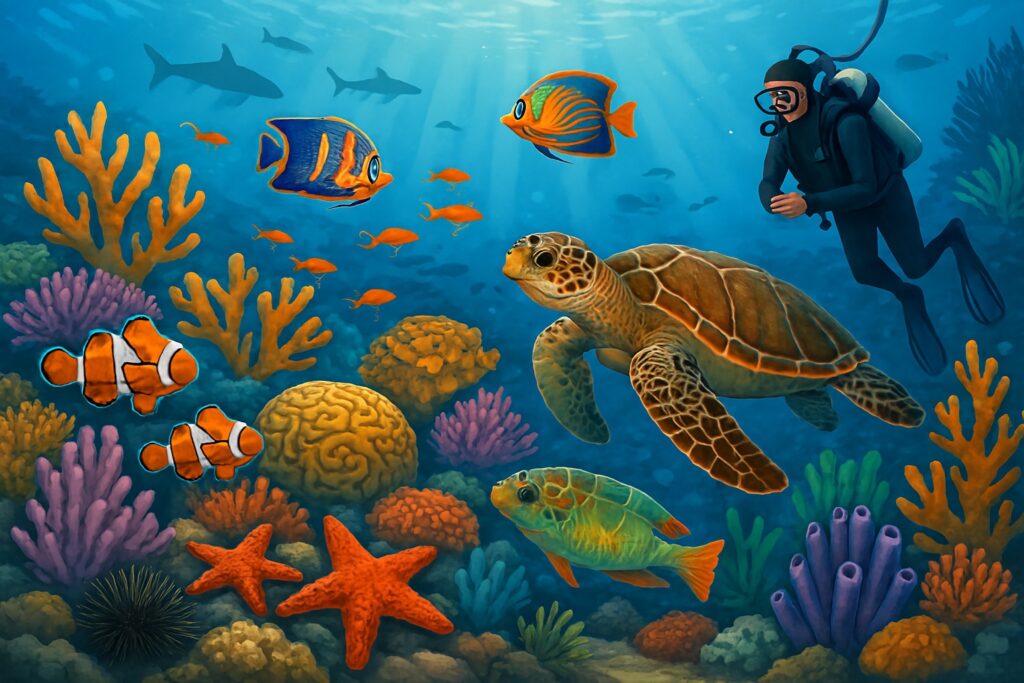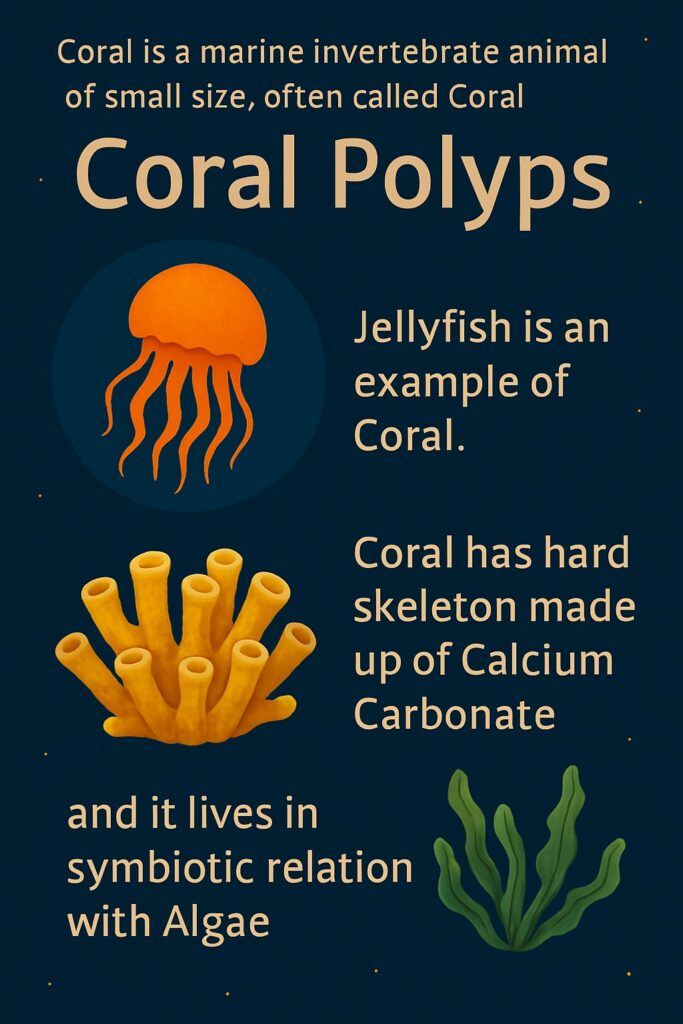Coral reefs are one of the most diverse and important ecosystems on Earth, providing habitats for millions of marine species and supporting the livelihoods of millions of people. India is home to some of the world’s most unique and diverse coral reef ecosystems, which are found in the Indian Ocean and the Bay of Bengal. In this article, we will explore the importance of coral reefs in India, the threats they face, and the efforts being made to protect them.

Table of Contents
What is coral?
Coral is a marine invertebrate animal of small size, often called Coral Polyps. Jelly Fish is an example of Coral. Coral has hard skeleton made up of Calcium Carbonate and it lives in the symbiotic relation with Algae.

The hard skeleton of Corals form the structure of coral reefs. Corals are found in warm, shallow waters around the world, and are known for their bright colors and unique shapes. They are important members of marine ecosystems, providing habitat and food for a wide range of other marine species. Coral reefs are some of the most diverse and complex ecosystems on Earth, and are often referred to as the “rainforests of the sea.”
What is Coral Reef?
A coral reef is an underwater ecosystem characterized by a community of living organisms that build and maintain a complex structure made of calcium carbonate, known as a coral colony. Coral reefs are formed by the accumulation of the exoskeletons of coral polyps, which are small marine invertebrate animals that secrete calcium carbonate to form a protective structure around their soft bodies.
Coral reefs are found in shallow, warm waters around the world, particularly in the tropics. Coral reefs are also important for the protection of coastlines, as they act as natural barriers against storms and erosion. They also have cultural and recreational value, and are popular destinations for diving, snorkeling, and other water-based activities.
Coral reefs are often called the “rainforests of the sea” due to their incredible biodiversity. They are complex marine ecosystems built by tiny coral polyps that secrete calcium carbonate to form large limestone structures. India, with its vast coastline and island territories, is home to some unique and ecologically important coral reefs.
How coral reef is formed?
Coral reefs are formed over long periods of time through the gradual accumulation of calcium carbonate exoskeletons secreted by coral polyps. The process begins when free-swimming coral larvae attach themselves to a hard substrate, such as a rock or a sunken ship, in a suitable location with warm, clear waters and plenty of sunlight.
As the coral polyps settle on the substrate, they begin to secrete calcium carbonate exoskeletons around their soft bodies, forming small coral colonies. Over time, these colonies grow and fuse together, forming larger structures that can eventually become coral reefs.
The growth and development of a coral reef depends on a number of factors, including water temperature, salinity, nutrient availability, and water clarity. Coral reefs require clear, warm water with low nutrient levels, as excess nutrients can lead to algal overgrowth and smother the coral.
Location of Coral Reefs of India
Coral reefs are found along the Indian coastline, particularly in the Andaman and Nicobar Islands, Lakshadweep Islands, and the Gulf of Mannar. These areas are home to some of the most diverse and important coral reef ecosystems in India.
1. Gulf of Kutch (Gujarat)
-
Location: Northwestern coast of India, Arabian Sea.
-
Type: Fringing reefs along islands and the coast.
-
Special Features:
-
First marine national park of India: Marine National Park, Jamnagar.
-
High tidal range, extreme salinity variations.
-
-
Threats: Industrial development, oil exploration, and pollution.
2. Lakshadweep Islands
-
Location: Arabian Sea, southwest of Kerala.
-
Type: Atoll reefs—the only atolls in India.
-
Special Features:
-
Formed on submerged volcanic peaks.
-
Rich in species like Acropora, Porites, and colorful reef fishes.
-
Low-lying islands with no rivers; clear waters ideal for reef development.
-
-
Uses: Tourism, fishing, and sea cucumber collection.
-
Threats: Coral bleaching, rising sea levels.
3. Gulf of Mannar (Tamil Nadu)
-
Location: Southeastern coast, between India and Sri Lanka.
-
Type: Fringing reefs near 21 uninhabited islands.
-
Special Features:
-
Part of the Gulf of Mannar Biosphere Reserve.
-
Habitat for dugongs (sea cows), seahorses, and mollusks.
-
Rich in pearl oysters and sea grasses.
-
-
Threats: Coral mining (now banned), overfishing, and coastal pollution.
4. Andaman and Nicobar Islands
-
Location: Bay of Bengal, off the eastern coast.
-
Type: Fringing and barrier reefs.
-
Special Features:
-
Largest and most diverse coral reef system in India.
-
Over 200 coral species recorded.
-
Important sites: North Bay, Jolly Buoy, Wandoor, Ritchie’s Archipelago.
-
-
Threats: Earthquakes, tsunamis (e.g., 2004 tsunami damage), tourism pressure.
Ecological Importance of Coral Reefs
-
Provide habitat and food for thousands of marine species.
-
Protect coastlines from erosion and storms.
-
Support fishing and tourism industries.
-
Serve as breeding grounds and nurseries for marine life.
Threats to Coral Reefs in India
-
Coral Bleaching due to rising sea temperatures.
-
Pollution from coastal industries and urban sewage.
-
Overfishing and destructive fishing practices like dynamite fishing.
-
Tourism and Unregulated Diving damaging delicate structures.
-
Climate Change and Ocean Acidification affecting coral growth.
Conservation Efforts
-
Marine Protected Areas (MPAs): Gulf of Mannar Biosphere Reserve, Marine National Park (Gujarat), Andaman & Nicobar MPAs.
-
Coral transplantation and reef restoration projects.
-
Bans on coral mining and fishing regulations in sensitive zones.
-
Public awareness and community-based reef monitoring programs.
Conclusion
Coral Reefs of India are ecological treasures that support marine biodiversity, coastal protection, and livelihoods. With growing environmental challenges, sustainable conservation, research, and public awareness are essential to protect these fragile marine ecosystems for future generations.